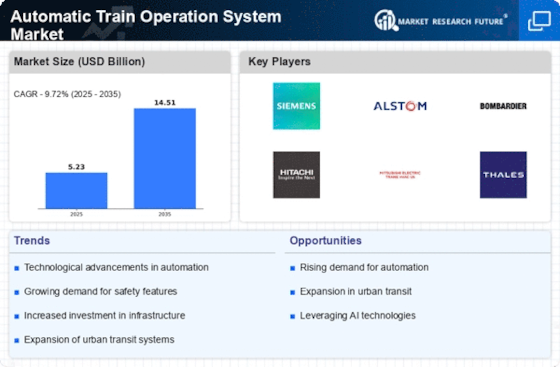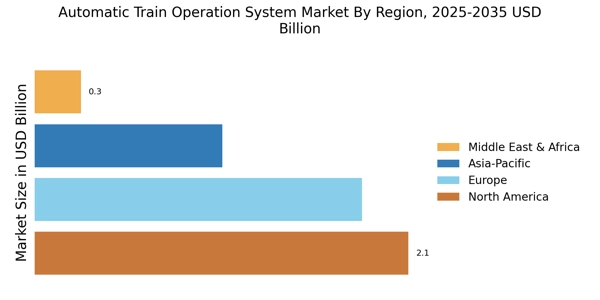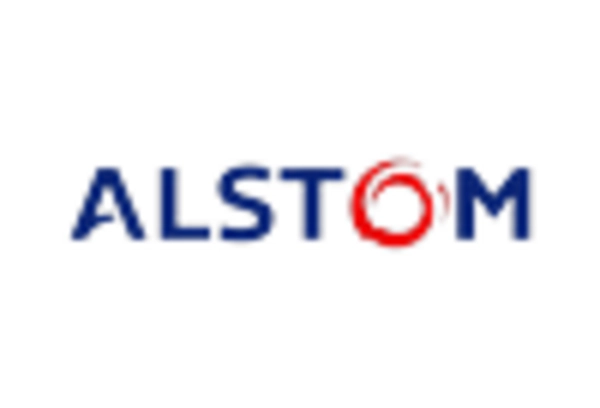Focus on Safety and Reliability
Safety and reliability are paramount concerns in the Automatic Train Operation System Market. With increasing passenger numbers, the demand for systems that ensure safe and reliable operations is growing. Automatic train operations reduce the likelihood of human error, which is a significant factor in many rail accidents. The integration of advanced safety features, such as automatic braking systems and collision avoidance technologies, enhances the overall safety profile of train operations. As a result, rail operators are increasingly investing in automatic systems to meet safety regulations and improve public confidence in rail travel. This focus on safety is likely to drive market growth, with an expected increase in investments in safety technologies by 25% in the coming years.
Environmental Sustainability Goals
The push for environmental sustainability is significantly influencing the Automatic Train Operation System Market. As nations strive to meet climate change targets, there is a growing emphasis on reducing greenhouse gas emissions from transportation. Automatic train operations are seen as a viable solution to achieve these goals, as they can optimize energy consumption and reduce emissions. Many rail operators are transitioning to electric and hybrid trains, which align with sustainability initiatives. The Automatic Train Operation System Market is expected to see a rise in demand for eco-friendly solutions, with projections indicating that the market for sustainable train technologies could grow by 30% by 2030, driven by regulatory pressures and consumer preferences for greener options.
Government Initiatives and Funding
Government initiatives and funding play a crucial role in the growth of the Automatic Train Operation System Market. Many governments are prioritizing investments in public transportation infrastructure to promote sustainable urban mobility. For instance, various countries have allocated significant budgets for the development of smart transportation systems, which include automatic train operations. These initiatives not only enhance the efficiency of public transport but also contribute to environmental sustainability by reducing carbon emissions. The Automatic Train Operation System Market is likely to benefit from these government policies, with funding expected to increase by approximately 20% over the next few years, facilitating the adoption of advanced technologies.
Technological Advancements in Automation
The Automatic Train Operation System Market is experiencing a surge in technological advancements that enhance operational efficiency and safety. Innovations such as artificial intelligence, machine learning, and advanced sensor technologies are being integrated into train systems. These technologies facilitate real-time monitoring and predictive maintenance, which can reduce operational costs by up to 30%. Furthermore, the implementation of automated systems allows for improved scheduling and reduced human error, leading to safer travel experiences. As cities expand and the demand for efficient public transport increases, the Automatic Train Operation System Market is likely to benefit from these advancements, potentially leading to a market growth rate of 15% annually over the next five years.
Increased Urbanization and Population Growth
Urbanization and population growth are driving the demand for efficient public transportation solutions, significantly impacting the Automatic Train Operation System Market. As urban areas become more congested, the need for reliable and efficient train systems becomes paramount. It is estimated that by 2030, urban populations will increase by over 1.5 billion people, necessitating the expansion of public transport networks. This trend is likely to propel investments in automatic train systems, as they offer a solution to alleviate congestion and improve travel times. Consequently, the Automatic Train Operation System Market may see a substantial increase in demand, with projections indicating a potential market size of over 10 billion dollars by 2028.

















